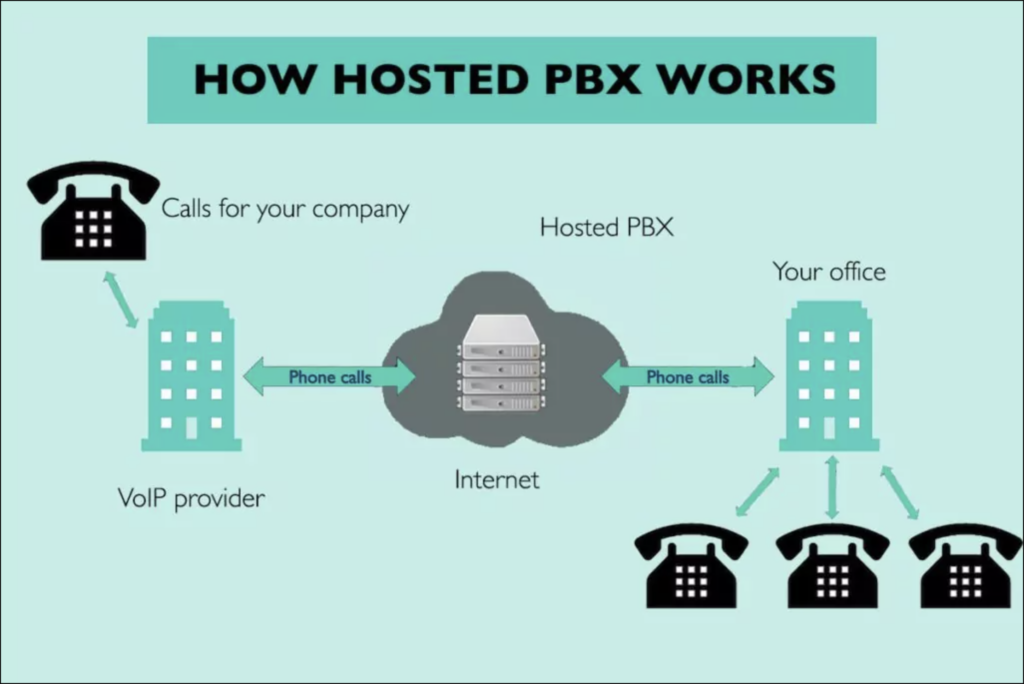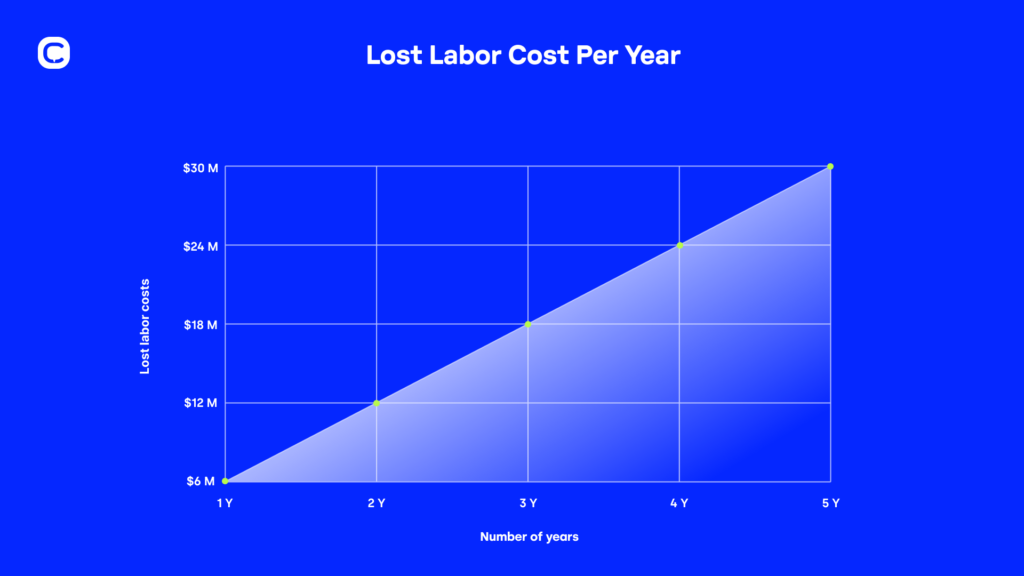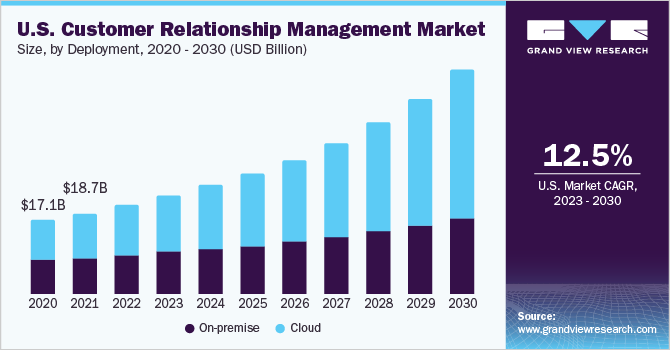What Is Hosted PBX, How Does It Work, and Why Your Business Might Need It?

The traditional landline is becoming increasingly obsolete—to the point where some countries are switching it off entirely. In response, many businesses have flocked to hosted PBX, causing the market size to explode to $63 billion.
And in making the switch to hosted PBX, they are reaping some pretty sweet benefits: Cost savings, remote flexibility, and rich, AI-powered features, for example.
So, is it time you followed suit? Let us make the case for hosted PBX to help you make an informed decision.
Key Takeaways:
- A hosted PBX is a phone system for managing calls, which is hosted away from your business premises by a third-party provider.
- To use hosted PBX solutions you need a provider, an internet connection, and any VoIP-enabled device (a phone, desktop computer, tablet, etc.).
- Hosted PBX is easier to set up, more cost-efficient, more scalable, and more future-proof than a traditional, on-premises alternative.
- When choosing a hosted PBX provider, you should consider the features, pricing plans, support, and how readily their solution integrates with your other business tools.
What Is Hosted PBX?
A hosted PBX solution delivers a range of functionalities and benefits, which we’ll explore in a moment. First, though, to understand what hosted PBX is you must first get to grips with what PBX is.
What Is a Private Branch Exchange (PBX)?
A Private Branch Exchange is a private business telephone system that companies use to connect and route internal and external calls.
Multiple users can be connected to a singular line and routed via their unique extensions. This enables you to make free internal calls and route incoming calls to the right place through a single phone number.
PBX systems come in three main varieties: Traditional PBX, IP PBX, and hosted PBX.
- Traditional PBX is an on-premises system that connects to the public switched telephone network (PSTN). They use physical, analog phone lines to transmit voice data.
- IP PBX, or digital PBX, uses VoIP to transmit calls over an internet connection. It can be installed at your office or in a third-party provider’s location, where it’s delivered as a hosted IP PBX service.
- And then there are hosted PBX phone systems, which we’ll explore in more depth below.
What Does It Mean For a PBX to be “Hosted”?
A hosted PBX— also sometimes known as HPBX—is a virtual phone system that’s hosted off-site by a third-party service provider. It utilizes Voice over Internet Protocol (VoIP) technology that enables companies to make and manage calls over the Internet.
This essentially means that your phone system is housed off-site by a service provider, rather than at your business’s physical location.
It’s similar to the concept of web hosting, where instead of managing a server in your office, you delegate it to a hosting provider.

The hosted provider is responsible for installation, configuration, management, and maintenance, significantly cutting down business costs and scaling productivity.
What Does PBX Do and How Does It Work?
The fundamental job of a PBX is to connect, route, and manage internal and external calls. To fulfill this duty, a hosted PBX phone system relies on three primary components: A hosted PBX provider, an internet connection, and VoIP-enabled devices.
- A Hosted PBX Provider
A hosted PBX provider is the service you use to “host” your PBX system. In other words, they store all of your equipment in their private data centers. They take care of the complicated, technical stuff like setup, operation, and ongoing maintenance. And, they’re responsible for ensuring high-quality, secure, and reliable communications. - An Internet Connection
To use hosted VoIP PBX services, you need a reliable, high-speed internet connection with plenty of bandwidth. Why? Because if your internet connection is unreliable or slow, it’s going to lower the quality of your calls and frustrate your customers.
Luckily, the internet connection you already have should be good enough. We recommend a minimum internet speed of 100 kbps per user. - VoIP-Enabled Device
A VoIP-enabled device is any device that allows you to make calls over the internet. So, along with VoIP desk phones and mobile phones, you can also use your desktop or laptop.
SIP Trunking: An Alternative to Hosted PBX
If you’re using a traditional on-premises PBX system but don’t feel ready to fully transition to the cloud, you can turn to Session Initiation Protocol (SIP) trunking.
SIP trunking provides your business with VoIP capabilities and benefits, without having to overhaul your entire on-premises PBX. It involves replacing your existing analog phone lines with SIP trunks, which are essentially digital phone lines.
SIP trunks convert voice data (as well as video, email, SMS, and more) into condensed digital packets which are sent to their end destination via the internet.
SIP trunk providers host your SIP trunks on their premises. But, unlike a fully cloud-hosted PBX system, you still keep and manage your existing PBX equipment. This is often referred to as a hybrid PBX system or a VoIP-hosted PBX.
Setting up SIP trunking is more complex and expensive than setting up a fully cloud-hosted PBX system.
You’ll need to configure your SIP trunks to work with your existing PBX. And, you need to set up and configure SIP endpoints and firewall traversal. So, SIP trunking is generally recommended for enterprises with complex telephone systems who are looking to ease into cloud migration strategy.
The Benefits of Hosted PBX
What are the benefits of hosted PBX in comparison to its traditional counterpart? Let’s discuss.
It’s Easier to Set Up and Maintain
To get set up with a traditional phone system, you need to install and configure a bunch of costly equipment. And, if something breaks or becomes outdated, you need to possess—or hire—the expertise to fix or upgrade it. This makes setup and maintenance complicated.
Hosted PBX providers eliminate that stress by handling all of your setup, configurations, and maintenance for you. Unlike a traditional PBX system, which can take weeks to set up, a hosted PBX can be up and running in a matter of days.
With CloudTalk, for example, you can set up your entire phone system in just a few hours, minimizing downtime and boosting productivity.
Provides Cost-Savings
Upfront costs are typically much lower if you opt for hosted PBX. With no on-site infrastructure required other than your VoIP phones and routers, you can leverage the benefits of VoIP on a tight budget.
There’s no need to hire IT teams to set up and maintain your hosted PBX system. And, your employees can even use their own phones.
If you opt for a traditional PBX system, you’re looking at a hefty investment. PBX servers alone can cost thousands of dollars, and then you have to consider the costs of installation, configuration, and maintenance for all of your on-premises equipment.
Of course, the exact cost savings you’re looking at will vary. Hosted PBX services typically offer tiered subscription packages that include different features. So, the cost of your solution will depend on your business’s needs.
Why not check out our in-depth guide to business phone system pricing to get a better idea of how pricing plans vary across providers?
Offers a Greater Range of Features
If they want to stay competitive, hosted PBX services need to provide their customers with optimized calling experiences. So, hosted solutions offer a range of powerful features beyond the basic calling functionalities supplied by traditional PBX.
Take CloudTalk’s business calling solution. It offers a selection of AI-powered features including Interactive Voice Response (IVR), automatic call notifications, call transcription, and plenty more to meet modern business communication needs.
12 Features To Be On The Lookout For When Choosing Your Call Center Software
Better Suited to Remote and Hybrid Working
Hosted PBX providers allow employees to download a piece of software onto their home desktop, laptop, or mobile device. This software can turn their remote device into a full-powered business phone system with the same capabilities as VoIP desk phones.
This means employees can make and answer work calls from any location. You can even set up call transfers to ensure that incoming calls are always routed to an available employee’s device, whether it be their desk phone or mobile.

On the flip side, a traditional PBX system pretty much chains employees to their office desks. So, this is a huge benefit of the hosted alternative if you want to empower remote and hybrid working.
Easier to Customize and Scale Up and Down
The hidden costs of non-scalable software and hardware can quickly mount up. Because hosted PBX doesn’t rely on rigid physical infrastructure, it’s inherently more scalable and responds well to fluctuating business needs.
For example, if you need to add users during peak seasons, you can do so without purchasing expensive new equipment. And, if demand decreases, you can scale down again without worrying about overhead costs.
You can also add new features and define new rules without having to be an expert—or employing one.
With a solution like CloudTalk, too, you don’t have to worry about extensive, time-consuming training for new agents. Our business calling solution is designed with a user-friendly interface. Once you’ve scaled up, your new team members can get started quickly.
Simpler to Integrate With Your Existing Tech Stack
Hosted PBX providers typically offer integrations with the most vital business tools in your tech stack. For example, CloudTalk gives you one-click integrations with your CRM, sales automation software, business intelligence tools, and more.
Why is this so advantageous?
Integrations simplify workflows by centralizing your different business applications onto one platform. Instead of switching between apps, you can access the functionalities you need in a single, easily accessible place.
Take CloudTalk’s HubSpot integration. You can sync HubSpot CRM to access customer data—demographics, past purchases, communication history, etc—for all of your incoming calls, right inside CloudTalk. And, make and receive calls directly within HubSpot.
Helps You Future-Proof Your Tech Stack
Telephony networks based on traditional hardware infrastructure (like landlines) are starting to reach the end of their serviceable lives. They’ve been in operation for many years, suffer from considerable wear and tear, and have become increasingly expensive to maintain.
Governments around the world, therefore, have decided that it’s not cost-effective to keep maintaining those networks. That’s why the UK, for example, is phasing out the PSTN with a complete switch-off scheduled for 2025. It’s part of the UK government initiative to completely transition from analog to digital phone lines.
And they aren’t the only ones. Australia, New Zealand, and Denmark are among the other countries planning a PSTN phase-out. So, you risk running your business communications on obsolete technology if you stick with traditional PBX.
Hosted PBX uses modern VoIP technology to enable internet-based calls. Not only that, but providers are continuously updating their systems to provide users with the freshest features and in-demand capabilities.
As a result, hosted PBX systems are future-proof, helping you achieve long-term sustainability, competitiveness, and growth.
On-Premises PBX vs. Hosted PBX
On-premises PBX is an expensive, rigid solution with limited calling capabilities that struggles to meet the demands of the modern business environment.
Hosted PBX is cost-effective, flexible, and rich with advanced features that support collaborative and customer-focused communications.
Here’s a side-by-side comparison to help you see the differences:
On-Premises PBX
Hosted PBX
Upfront Costs
High upfront costs—you need to purchase expensive equipment and hire personnel to install and configure the system.
Low initial cost—all you need to purchase upfront are your compatible devices.
Long-Term Costs
On-premises PBX is expensive to maintain and tends to incur hefty long-distance calling charges.
Hosted PBX incurs no maintenance fees—everything is handled by the provider. All you pay is a monthly subscription fee.
Features
You only get basic calling features.
You can leverage advanced calling features.
Integrations
Incredibly difficult—often impossible—to integrate with your other systems.
Can integrate your hosted PBX solution with a wide range of business tools.
Best Suited For
Large enterprises with incredibly complex infrastructures.
Small, medium, and large businesses.
Scalability
Hard to scale without increasing your monthly costs.
Easy to scale up and down without incurring high expenses.
What to Consider When Choosing a Hosted PBX Provider
What should you look for in a PBX host? Let’s walk through the key things to consider when you’re comparing hosted PBX providers:
Pay Attention to Call Quality
With so much focus on delivering speedy, convenient calling experiences, it’s easy for call quality to become an afterthought.
However, we did some digging into the importance of call quality to businesses and discovered that 42% of customers will avoid calling your company’s customer support after experiencing audio quality issues.
And it’s not just your customers who may churn, it’s your employees, too. Audio quality issues distract and frustrate employees. It ruins their concentration and efficiency, making it harder for them to have productive conversations.
In fact, poor call quality could be costing your company $6,000,000 each year in lost labor alone.

Choose a hosted PBX provider that consistently prioritizes call quality. The best providers should have a globally distributed server infrastructure, offer live call quality monitoring, and take steps to guarantee low latency and minimize downtime.
Make Sure You Have a Wide Choice of Business Phone Numbers
You don’t have to have a physical headquarters in a country to establish a local presence there. All you need is a local phone number. But does your hosted PBX provider offer local and toll-free numbers in the countries you operate in?
Look for a provider with a wide availability of business phone numbers. CloudTalk is currently leading the market with phone numbers available across 160+ countries.
Explore the Features and Functionalities Available
Before you start comparing providers, write a list of the features and functionalities that your business needs in a hosted PBX system.
Identify essential features and nice-to-haves so that you can check that your favorites have the features you need to meet your business goals.
And remember, the solution with the most features isn’t necessarily the best. If you’re paying more for a bunch of fancy features that you’ll never use, you’re not going to get the most bang for your buck.
Examine Pricing Plans and the Value For Money They Provide
Most hosted PBX providers offer three or four pricing plans to suit different needs and budgets. For example, they might have a PBX for small business use, a PBX for medium-sized companies, and a PBX for large enterprises, all with different features.
Do some shopping around to find the plan that offers the most value for money.
Look beyond the monthly subscription fee to determine the long-term value. Does the solution have features that will streamline operations and drive cost savings? How about AI-powered capabilities that improve customer experiences, satisfaction, and revenue?
Remember, you can always upgrade or downgrade depending on your business needs. So, evaluate all of the pricing plans offered by your chosen provider to ensure that they can support your needs as you grow.
Look For Integrations With Your Existing Business Tools
Most hosted PBX services offer native integrations. But does your provider cover all of the essential business tools in your tech stack? That’s something you’ll want to find out before you invest in a solution.
Take your CRM, for example. It’s your most powerful tool for managing customer data, enabling you to provide personalized experiences across your entire customer lifecycle and foster loyalty at scale.
Almost every business industry you can think of needs a CRM (which explains why the global CRM market is worth $65 billion). Hosted PBX service providers know this, which is why the best of them typically offer easy integrations with the most popular CRMs on the market.

That said, some providers only support integrations with the biggest names in the game, like Salesforce and HubSpot. If you don’t fancy switching your CRM, look for a provider that offers integrations with the CRM you already use. Along with Salesforce and HubSpot, CloudTalk supports integrations with Zoho CRM, Onpipeline CRM, Copper, and more—plus, it’s also easy to use Zapier to create custom integrations.
When studying a potential provider’s website, look for information on their native integrations and whether they also offer APIs. If you speak directly to a provider, make sure to ask them which tools their solution works with. Or, better still, tell them which of your current solutions you can’t do without.
Think Carefully About Security and Reliability
It’s a common misconception that cloud PBX systems are less secure than on-premises alternatives. In fact, switching to a cloud-hosted PBX solution can fortify your data against threats better than onsite solutions—providing you choose the right PBX service.
Reputable hosted PBX providers have rigid security measures and protocols built into the core of their solutions. Verify that the provider you choose has implemented robust and reliable security measures and practices like:
- End-to-end call encryption.
- Secure call recording.
- Multifactor authentication.
- Security certifications and compliance, like PCI, SOC, and STIR/SHAKEN.
- Regular patches and updates.
- Consistent penetration testing and auditing.
Don’t forget to check the reliability of these security measures by reading verified customer reviews.
Explore the Availability and Quality of Support on Offer
Every minute of downtime costs your business money. You want to be sure that should you run into an issue, you can rely on your PBX hosting provider to be available and easily accessible.
So, check the level of support offered by your provider. Verify:
- Availability: Does your provider offer 24/5 or 24/7 support?
- Channels: Can you receive support via phone, email, and/or live chat?
- Response times: How quickly can you receive support from your provider? Do they communicate any guaranteed response times for support? CloudTalk’s average response time is under one minute.
- Self-service resources: Is there a wide selection of readily accessible self-service resources like troubleshooting guides, how-to articles, and FAQs?
Find the Perfect VoIP Package for Your Business
Choose Hosted PBX to Boost Productivity and Cut Costs
Want to transition to the cloud but don’t want to do it alone? A cloud-hosted PBX is the perfect choice for businesses that want to cut costs and leverage all the benefits of cloud PBX while maximizing productivity.
Let your provider handle everything from setup and installation to maintenance and security. All while empowering your employees with remote working flexibility, enhanced communication, and productivity-boosting integrations.
So, do you think you’re ready to make the switch to a hosted PBX? If so, why not give us a call?
What did you find in this article?
What’s the Difference Between PBX and VoIP?
PBX stands for Private Branch Exchange and it describes the telephone network used by an organization.
VoIP stands for Voice over Internet Protocol and it’s the technology that allows you to make calls over the internet. A traditional PBX uses analog phone lines, while a hosted PBX uses VoIP to facilitate internet-based calling.
Check out this resource comparing hosted PBX and VoIP to see whether you want a fully-fledged hosted business phone system or a simpler VoIP-only solution.
How Do I Know If I Should Switch to Hosted PBX?
If your current phone system is struggling to meet rising demands or PBX maintenance and upgrade costs are swallowing most of your budget, it might be time to look at a hosted PBX solution.
Similarly, if you’re struggling to accommodate remote working or your siloed systems are causing productivity issues, a hosted business PBX might be the way forward.
What Equipment Do I Need For Hosted PBX?
An internet connection and VoIP-enabled devices are all you need if you opt for a hosted PBX VoIP service.
























